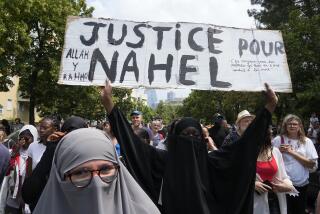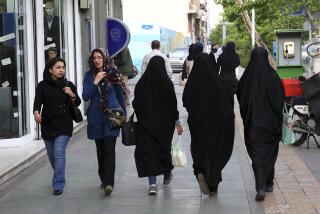Chirac Demands Captors Release Two Journalists
- Share via
PARIS — President Jacques Chirac mobilized his government Sunday to free two French journalists held in Iraq by Islamic militants who have demanded that France drop a new ban on Islamic head scarves in schools.
In a televised statement, Chirac demanded that the militants free the journalists, who have been missing for more than a week, and announced he had dispatched his foreign minister to the Middle East to seek their release. The captors have issued a deadline that expires today.
Emergency meetings of Cabinet ministers Sunday preceded Chirac’s decision to take to the airwaves. Unscheduled presidential statements are rare in France, especially on the last weekend in August, when many citizens are returning from summer vacations.
Chirac did not specifically mention the ban on head scarves -- and other overt religious symbols -- that goes into effect when school starts Wednesday. Instead, he sought to stress that France allowed the free practice of all religions within its secular tradition.
“France is a land of tolerance,” Chirac said. “France assures equality, respect and protection of the free exercise of all religions within our common law. This tradition, anchored in our history, is the cement of our national cohesion. These values of respect and tolerance inspire our conduct throughout the world.... They also inspired France’s policy in Iraq.”
Chirac’s careful choice of words expressed the political predicament created by the kidnapping of the journalists, Georges Malbrunot of Le Figaro newspaper and Christian Chesnot of Radio France International. The Islamic Army in Iraq has claimed to have kidnapped them, the same militant group suspected in the recent abduction and slaying of an Italian journalist.
French leaders hoped their staunch opposition to the Iraq war and strong alliances in the Arab world would help the nation avoid such incidents. But the hostage-taking confirms warnings by counter-terrorism experts here that France remains a target of Islamic extremists with a hunger for international notoriety and a virulent ideology that often makes little distinction among Western nations or the nuances of their foreign policies.
The crisis has arisen as French officials, students and the Muslim community prepare for the implementation of the head scarf ban, which was proposed by Chirac in December and approved resoundingly by Parliament.
Polls show that a majority of French voters agree with the president’s view that the law was needed to shield France’s secular tradition in schools and other public institutions. The law also prohibits other religious symbols such as Islamic veils, large Christian crosses and Jewish skullcaps.
The ban has divided France’s approximately 5 million Muslims, Europe’s largest Islamic community. Moderates have reluctantly accepted it, whereas more conservative groups have urged girls to show their defiance by wearing veils to school.
Until now, though, there were hopes for a relatively calm return to school, or rentree, as it is known in France. The government planned a firm but low-key approach, instructing educators to attempt dialogue rather than turning away veiled girls at school gates. French extremists had not shown signs of preparing major protests or disruptions, according to intelligence officials, who have redoubled their aggressive surveillance of sermons at mosques and other activity.
“It seems the imams want to calm things down,” a high-ranking intelligence official said in a recent interview. “The message is for Muslim families to look for quiet solutions. And many of the radicals seem interested mainly in using the ban to recruit and to create their own Islamic schools.”
French Muslim leaders were unanimous Sunday in their condemnations of hostage-takers in Iraq.
“We cannot accept any outside interference,” said Lhaj Thami Breze of the Union of French Islamic Organizations, which had said it would resist the ban.
In February, the head scarf ban drew fire from Ayman Zawahiri, the second highest-ranking figure in the Al Qaeda terrorist network. In an audiotape, the fugitive Zawahiri accused Chirac of defending indecency and decadence while oppressing Muslim women and demonstrating “crusader hatred” of Islam.
A respected Muslim leader spoke out in defense of France in December. Mohammed Sayed Tantawi, grand imam of the influential Al Azhar Mosque in Cairo, said that “it was the absolute right” of France and other non-Muslim countries to pass legislation restricting use of the Islamic head scarf.
More to Read
Sign up for Essential California
The most important California stories and recommendations in your inbox every morning.
You may occasionally receive promotional content from the Los Angeles Times.










